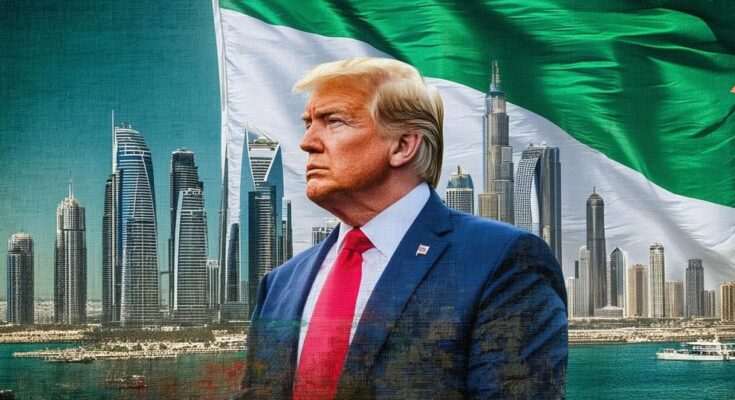Saudi Arabia and the UAE are likely to support Donald Trump’s return to the White House due to his alignment with their regional interests, particularly concerning military support and countering Iran. In contrast, Vice President Kamala Harris’s expected policies may not align with the desires of the Gulf states, as they prefer Trump’s transactional approach to diplomacy that bolstered their power during his previous administration. This preference reflects a deeper strategic calculation, with concerns over regional stability and security commitments from the U.S.
Saudi Arabia and the United Arab Emirates (UAE) perceive the potential return of former President Donald Trump to the White House as a significant opportunity to advance their regional objectives. The ongoing conflict between Israel and Hamas in Gaza, coupled with rising tensions throughout the Middle East, has heightened the Gulf states’ geopolitical anxieties. As the U.S. election approaches, one would anticipate a preference for stability aligning with Vice President Kamala Harris, the Democratic nominee. Yet, the policies she is expected to endorse may not align with the stability the Gulf states seek. Harris’s anticipated approach, which suggests a tougher stance on the ongoing conflicts in Sudan and Yemen along with a commitment to engaging diplomatically with Iran, diverges from the geopolitical interests of the Gulf states. Consequently, there is a strong inclination within Saudi Arabia and the UAE to support Trump, whose transactional diplomatic style previously bolstered their regional power. Under Trump’s administration, these states experienced unprecedented levels of U.S. support, notably through arms deals and a hardline approach to Iran, which starkly contrasts with the anticipated policies under Harris. Harris’s foreign policy signals a potential revival of the diplomatic strategies utilized during former President Barack Obama’s tenure, which may lean towards more restrained engagement with Saudi Arabia and the UAE. This situation raises concerns regarding the possibility of a renewed focus on a two-state solution in the Israeli-Palestinian conflict, as both Gulf states see greater advantage in maintaining a deep relationship with Washington through Trump, who had demonstrated strong support for their interests in the region. Historically, Trump’s administration enabled Saudi Crown Prince Mohammed bin Salman to expand U.S.-Saudi military ties, for instance through a proposed security pact that required Saudi normalization with Israel, contingent upon significant progress toward Palestinian statehood. Under Trump’s tenure, Riyadh also aimed to enhance its military capabilities, such as acquiring advanced air defense systems to counter regional threats, most importantly from Iran. These discussions have been complicated by ongoing events, including the current Gaza conflict. Moreover, the UAE’s preferences closely align with Trump’s policies that favored advancements in its military capabilities and regional influence, as demonstrated by its signing of the Abraham Accords, which facilitated better economic and military ties with Israel. A Trump presidency could potentially exacerbate the competitive dynamic between Saudi Arabia and the UAE, given that both seek to enhance their positions through American support. This rivalry might create challenges for U.S. foreign relations, particularly as both states seek greater military and economic advantages in a fluctuating regional landscape.
The Gulf States, particularly Saudi Arabia and the UAE, are navigating a complex geopolitical landscape marked by ongoing conflicts and shifting alliances in the Middle East. With tensions heightened due to Israel’s interventions in Gaza and concerns about Iranian influence, the Gulf states are assessing their strategic options in light of the upcoming U.S. presidential election. Their preferences for U.S. foreign policy are influenced heavily by the approaches of the major candidates, particularly the contrasting styles of Donald Trump and Kamala Harris. Trump’s previous administration provided an environment that favored Saudi and Emirati ambitions, which they fear might be compromised under Harris’s administration, known for a more multilateral diplomatic strategy.
In conclusion, as the U.S. election approaches, Saudi Arabia and the UAE appear to favor the return of Donald Trump, largely driven by concerns over regional stability and their geopolitical ambitions. Trump’s historical alignment with their interests presents a stark contrast to the anticipated foreign policy of Kamala Harris, which may not prioritize their objectives. The Gulf states continue to seek enhanced military capabilities and reassurance from Washington, further complicating the dynamics of their rivalry and the broader geopolitical context in the Middle East.
Original Source: foreignpolicy.com




